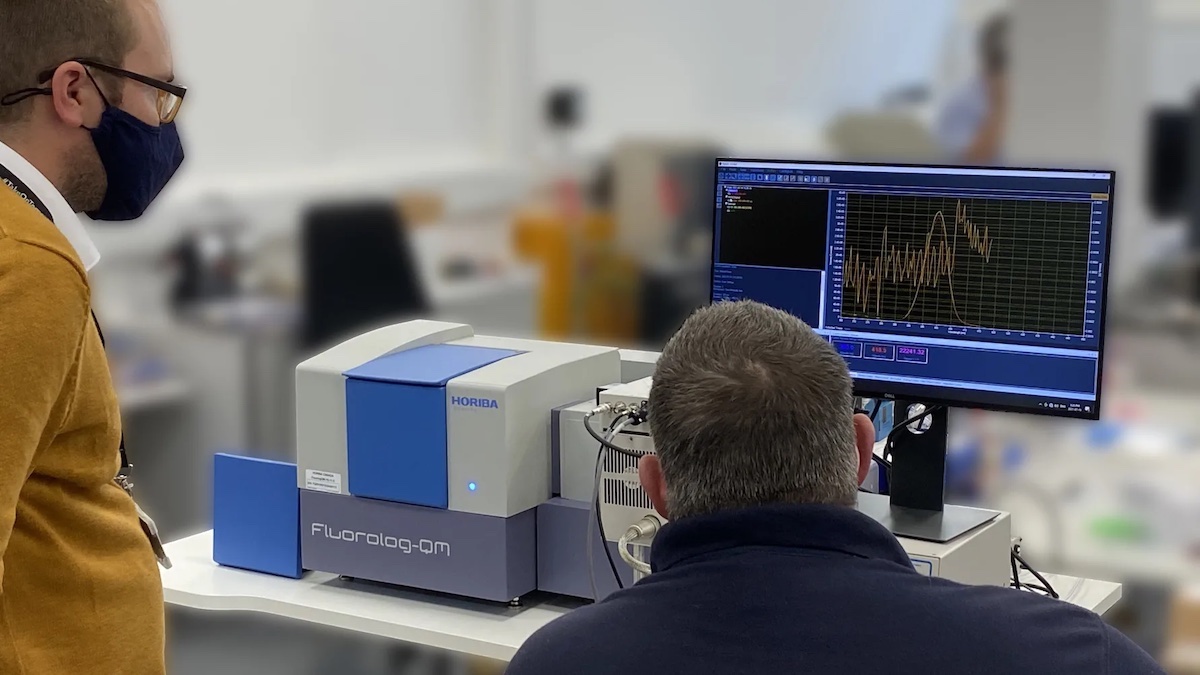Channels
Special Offers & Promotions
Northumbria University becomes UK

Academics in search of solutions to creating more energy efficient phones and television screens now have high-performance machinery at their fingertips, after Northumbria University has invested in a suite of new state-of-the-art equipment to push its leading-edge research forward.
Investment in a Fluorescence Spectrometer, which has now been installed in a lab within Northumbria’s department of Mathematics, Physics and Electrical Engineering, will further research led by Dr Marc Etherington and help shape the next generation of electronic devices.
The last 18 months have seen us all communicating through devices such as laptops, phones, and tablets more than ever. Finding ways of doing this as energy efficiently as possible is one of the key aims of Dr Etherington’s Fluorotonix Project, which is being supported by the Royal Society of Chemistry.
Organic Light Emitting Diodes (OLEDs) are smart materials used widely in phone screens, tablets, and TV screens. However, scientists believe they can be made more efficient.
Dr Etherington said: “We want to work with industries to create a better product, while also reducing energy consumption, which includes having to charge your phone or electrical device every day.”
As part of the research, organic blue light-emitting materials or fluorophores, such as quinine found in tonic water, will be studied to find out whether the compound can be applied within electronic devices.
The Fluorescence Spectrometer, developed and installed at Northumbria by Northampton-based HORIBA UK, will allow Dr Etherington to further the scientific understanding of fluorophores and whether they can offer light-based solutions to real-world issues.
“Installing state-of-the-art equipment at Northumbria will help us take this investigation further,” Dr Etherington added.
“We want to know if we can take inspiration from nature, capture that efficiency, and use it to address this blue OLED challenge that the industry is facing.”
The spectrometer is the latest in a series of investments in new equipment and facilities to support pioneering research activity within the University’s Faculty of Engineering and Environment.
Renowned for undertaking research into modern and ancient environments, the University’s Cold and Palaeo Environments group is focused on past and current climates, ice, snow and permafrost.
Northumbria has recently invested in two new major pieces of equipment to help researchers push forward their world-leading studies.
The Ion Chromatography System, newly located in the geochemical lab within the department of Geography and Environmental Sciences, is a high precision instrument for detecting the chemical ions dissolved in water.
The ions, although naturally occurring, can be harmful pollutants and can trace the chemical processes of the Earth's water bodies, including glaciers, streams, oceans and lakes.
Geochemist Dr Joseph Graly has plans to use the system to analyse the chemistry of waters from glaciated regions including, Antarctica, Greenland, and Jan Mayen in Norway.
Northumbria is also leading major studies into Siberia’s permafrost, or frozen ground, examining how it has expanded and contracted in response to the changing climates of the past, and how the cold glacial and warmer interglacial periods contributed to its forming and thawing respectively.
Following the installation of a new clumped isotope lab, also within the Geography and Environmental Sciences department, Northumbria becomes one of just four universities in the country to be able to undertake the detailed tests required to reconstruct the historic temperature conditions. The research forms part of the IsoPerm project, led by palaeoclimatologist Dr Sebastian Breitenbach.
Faculty Pro Vice Chancellor, Professor John Woodward, said: “Northumbria University’s research volume and quality have grown substantially in recent years.
“It’s thanks to continued investment in equipment and facilities that we are able to deliver impactful research projects and knowledge exchange collaborations alongside high quality teaching and learning for our students.”
Business Development Manager, Samantha Tennant, said: “As a national leader in business and innovation, at Northumbria University we develop partnerships with businesses, public sector organisations and charities, offering access to our facilities and applying our expertise to deliver demonstrable benefits and impact in order to address challenges and maximise opportunities in those organisations.
“Together we can explore and develop new opportunities and new ways of thinking.”
The University offers its facilities and specialist equipment for use in consultancy or research.
Information on how to access and hire the kit available can be found online here
Media Partners


